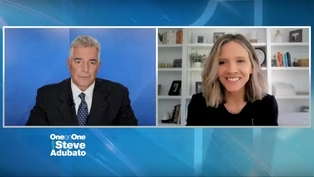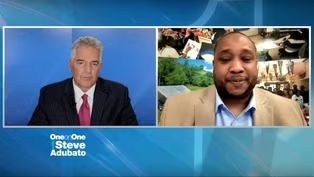One-on-One
The Significance of Maintaining Your Vascular Health
Clip: Season 2023 Episode 2637 | 7m 37sVideo has Closed Captions
The Significance of Maintaining Your Vascular Health
Chief of Vascular Surgery at Englewood Health, Thomas Bernik, MD joins Steve Adubato for an important conversation about vascular health and the evolution of vascular surgeries.
Problems playing video? | Closed Captioning Feedback
Problems playing video? | Closed Captioning Feedback
One-on-One is a local public television program presented by NJ PBS
One-on-One
The Significance of Maintaining Your Vascular Health
Clip: Season 2023 Episode 2637 | 7m 37sVideo has Closed Captions
Chief of Vascular Surgery at Englewood Health, Thomas Bernik, MD joins Steve Adubato for an important conversation about vascular health and the evolution of vascular surgeries.
Problems playing video? | Closed Captioning Feedback
How to Watch One-on-One
One-on-One is available to stream on pbs.org and the free PBS App, available on iPhone, Apple TV, Android TV, Android smartphones, Amazon Fire TV, Amazon Fire Tablet, Roku, Samsung Smart TV, and Vizio.
Providing Support for PBS.org
Learn Moreabout PBS online sponsorship(upbeat music) - We're pleased to be joined by Dr. Thomas Bernik, who's chief vascular surgeon at Englewood Health, to disclose one of the underwriters of our health programming.
Doctor, great to have you with us.
- Thank you for having me, Steve.
- We were just talking before we got on the air.
I will not go through the details of the vascular issues that have been in my family that I've become all too familiar with.
But here's the question, what is vascular disease?
- So, vascular disease is a disease of the arteries in the body, which affect really all the arteries, but primarily the heart, the great vessels, the vessels that lead to the arms and legs in particular, and also the carotid arteries that lead to the brain.
- This area, right?
- Yeah, the carotid arteries run along the front, the anterior border of the neck, and the vertebral arteries run along the back and supply the back of the brain.
- How do we know?
Because everything is going on inside us, how do we know that there's reason to be concerned about potential vascular disease?
- Well, so risk factors are a big part of it, of course.
You know, genetic history, family history, is something that is, you know, that is really very important to identify early on as you age, 40, 50, 60 for certain vascular conditions.
Other vascular conditions, for instance, atherosclerosis, is picked up either when someone is symptomatic, and there's different types of symptoms, mini-strokes, for instance, for carotid artery disease, or pain in the legs when you walk for lower extremities.
And so, you know, you have to break up vascular disease into the narrowing of the arteries.
And also then you have other entities such as aneurysms which is a completely different disease pattern.
- Obesity play a role here?
- Interestingly, yes and no.
I mean, the link between, you know, increased cholesterol and lipid management is clear in vascular disease, but the prevalence of vascular disease in obesity is not what we would think.
The main players for atherosclerotic, narrowing of the artery vascular disease, is really genetics, smoking and diabetes.
- Go back to the atherosclerosis issue.
Are we really talking about plaque?
Because without going too much into the detail about my own family situation, and I'm constantly getting the level of plaque buildup checked.
- Correct.
- The reason for that is not for me, but for anybody, why is that?
- Well, multiple reasons.
Plaque buildup is a buildup of cholesterol, calcium deposits, which builds up within the vessel wall.
It can be anywhere.
And again, if it's in the neck, it can lead to stroke, if it's in a low extremities or in the abdomen, it can lead to narrowing and lack of blood flow.
And the reason it's important is because as the plaque builds up, just like you're looking at a river, if rocks build up in a certain area there's a restriction of flow.
The body needs flow in order to survive.
So a leg needs oxygen and blood.
And so if you have a narrowing somewhere in the pelvis or the upper leg, the leg will have trouble functioning.
And in extreme cases, a lack of blood flow can lead to, you know, to gangrene and potential limb loss.
- Surgeries, meaning, well, not just surgery, medical intervention dealing with vascular disease, how much different is it today, 2023, versus 5, 10, 15 years ago?
- Vastly different.
Most of the major, major surgeries that we do particularly revolving around, let's say, aneurysmal disease, 95% of the aneurysmal disease, and that's basically a weakening in the artery, it's just opposite of what we're talking about.
Atherosclerosis can lead to that.
But aneurysm surgery has completely been turned upside down with endovascular stent grafting where previously patients would stay for five days, more depending, with a fairly significant mortality and morbidity, opening the belly, opening the chest.
Now we can do it with a stent graft overnight.
Similar for atherosclerosis of the legs, where we do majority of endovascular treatments now, which are with catheters, Roto-Rooter type of devices, stents and that sort of thing.
- It's so interesting because, you know, again, genetics play a part of it, but, again without disclosing too much, my dad had a whole range of vascular issues, but also there are other risk factors involved.
And because I knew it, and this is for anybody who has family history, and there are millions of people who do, there are things that we can and should be doing for ourselves.
It doesn't guarantee the outcome, but it does help us.
Does it not doctor?
- It does.
I mean, whatever's in your control as far as risk factor modification is obvious, right?
Smoking cessation, you know, lipid lowering drugs, statins, blood pressure control, control of diabetes.
You can only do so much with diabetes, but obviously control of diabetes, and high blood pressure.
The genetic factors, if they do exist, you know, you can do genetic testing of course.
- Yep.
- And genetic counseling to follow.
That's unfortunately out of your control, but it's gonna be risk factor modification, you know, after that.
- Sorry for sharing so much about my own situation and my family history.
It's just that I've learned that so many others are dealing with this, or may not even be aware of it.
So Doctor, you did a great public service by joining us.
Dr. Thomas Bernik, Chief Vascular Surgeon at Englewood Health.
Thank you, Doctor, for joining us.
We appreciate it.
- Thank you very much.
Have a good day.
- I'm Steve Adubato.
We thank you so much for joining us.
Be well.
See you next time.
- [Narrator] One-On-One with Steve Adubato has been a production of the Caucus Educational Corporation.
Funding has been provided by The Turrell Fund, supporting Reimagine Childcare.
The Healthcare Foundation of New Jersey.
PSE&G, NJM Insurance Group.
Horizon Blue Cross Blue Shield of New Jersey.
Rowan University.
The New Jersey Economic Development Authority.
The New Jersey Education Association.
And by PSC.
Promotional support provided by NJ.Com.
And by NJBIZ.
- At the Turrell Fund, We know childcare creates transformative early learning experiences for young children, and helps families succeed.
Childcare is essential for the economy, driving financial growth and sustainability across all sectors.
The Turrell Fund envisions a New Jersey in which every infant and toddler has access to high quality, affordable childcare In order to grow, develop and thrive.
Our children are our future.
For more information, visit TurrellFund.org.
Normalizing Grief Counseling For Our Youth
Video has Closed Captions
Clip: S2023 Ep2637 | 10m 8s | Normalizing Grief Counseling For Our Youth (10m 8s)
This Entrepreneur is Helping Families in Need
Video has Closed Captions
Clip: S2023 Ep2637 | 9m 51s | This Entrepreneur is Helping Families in Need (9m 51s)
Providing Support for PBS.org
Learn Moreabout PBS online sponsorship
- News and Public Affairs

Top journalists deliver compelling original analysis of the hour's headlines.

- News and Public Affairs

FRONTLINE is investigative journalism that questions, explains and changes our world.












Support for PBS provided by:
One-on-One is a local public television program presented by NJ PBS

